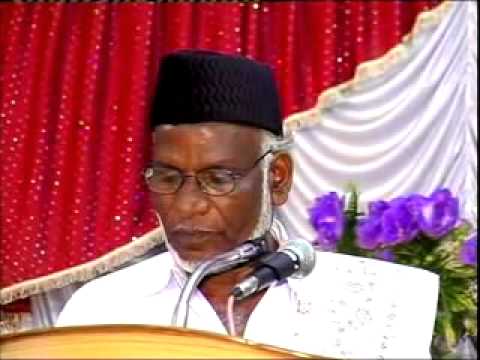Remembering anti-caste leader T. M. Umar Farooq on 6th death anniversary

T. M. Umar Farooq was born a Hindu as T. M. Mani, in the Thanjavur district of Tamil Nadu. His ancestors were bonded labourers and he only had primary education. T. M. Mani, however, was well versed in Tamil literature and its philosophical tradition. As an anti-caste activist, he also had a good understanding of Marxist ideologies. He was jailed several times while protesting for the cause of the marginalized. T.M. Umar Farooq believed that Islam is the only religion that will help the Dalits gain self-respect. The great leader passed away on June 5, 2015.
Shalini S | TwoCircles.net
TAMIL NADU – T. M. Umar Farooq is a legendary anti-caste leader and social activist from the state of Tamil Nadu in India. He was born a Hindu and later converted to Islam. Like Dr B R Ambedkar, he strongly believed that only religious conversion can emancipate the Dalits and advocated for the same throughout his life. On June 5, his death anniversary was commemorated by the Fraternity Movement of Pondicherry University through the online platform Facebook.
An expert talk on the life of T. M. Umar Farooq was delivered by Jalaluddin Z, State General Secretary, Islamiya Jananaya Peravai (Islamic Democratic Front), Pondicherry.
T. M. Umar Farooq was born a Hindu as T. M. Mani, in the Thanjavur district of Tamil Nadu. His ancestors were bonded labourers and he only had primary education. T. M. Mani, however, was well versed in Tamil literature and its philosophical tradition. As an anti-caste activist, he also had a good understanding of Marxist ideologies. He was jailed several times while protesting for the cause of the marginalized.
In 1960, as a 16-year-old, he started a political organization for the youths, and it was later established as Ambedkar Educational and Developmental Society in 1962. He closely worked with L. Elayaperumal, another anti-caste leader from Tamil Nadu. In the 1990s, T. M. Mani started the Neela Puligal Iyakkam (Blue Panthers Movement). He staunchly fought against the caste system through his Blue Panthers Movement.
But regional movements like that of T. M. Mani and P. Chandra Bose from Paramakudi (Ramanathapuram district), founder of Thiyagi Immanuel Sekaran Perava (Martyr Immanuel Sekaran Front), were side-lined by state-level parties. Many anti-caste state-level parties were formed with Tamil Nationalist ideologies, and some parties tried to address the caste issues by gaining political power.
T.M. Mani rejected both the choices in addressing the caste issue. He felt that Tamil nationalist ideology had its base in Hinduism. He rejected electoral politics as the scheduled caste will never be able to garner majority votes and come into “real” power where caste issues can be addressed.
T. M. Mani even considered communism as a choice but rejected the idea as he points out that oppression in India comes from the Varna system and not class conflict.
After considering various options, T.M. Mani firmly prescribed religious conversion as the only tool for Dalit emancipation. He advised the Dalits to break free of the gods that enslaved them through the Hindu caste order.
T. M. Mani encouraged thousands of his followers to convert to Islam and liberate themselves. One lingering question however was, why he chose Islam, when Ambedkar, the backbone of the anti-caste movement took to Buddhism.
T. M. Mani in his book Ambedkar in Madam Maatram (Ambedkar’s religious conversion) points out the weakness in the logic of Buddhist conversion. He justified the rationale behind converting to Islam in almost all of his books, speeches and articles. Ambedkar suggested that the Dalits convert into other religions to strengthen their numbers, for which T. M. Mani held that conversion into Buddhism did not result in the strengthening of numbers but compounded the problem as Buddhists remain as the second smallest religious minority in India.
T. M. Mani also rejected Buddhism as he found the religion culturally identified with Hinduism. He also pointed out Buddhism, Jainism and Sikhism in the Indian constitution (Article 25 (a) – Explanation II in clause b) legally construed as a part of the Hindu religion. Hence, he suggested his followers convert to Islam to strengthen the number and had discussed this idea since the 1980s.
Jalaluddin also pointed out in his talk that the population of Muslims before partition was one-third of the nation’s population and the conversion of scheduled castes and scheduled tribes to Islam (if at all suggested by Dr B R Ambedkar) would have resulted in Muslims becoming the majority. This was a huge threat to the caste Hindus, and Hindutva leaders of the time pressurized Ambedkar not to suggest Islam as his religious choice of conversion.
This apprehension of T.M. Mani’s was welcomed by his followers and they converted to Islam en masse. By May 2007, T. M. Mani officially converted to Islam and came to be known as T.M. Umar Farooq, his wife, Agilammai too became Aysha Ammal. His entire life was a struggle against casteism. He considered various options and deeply studied how Dalits could be liberated.
He has written several books including Theendamaiku Theervu (Solution for Untouchability), and Saathi Ozhindhadhu (Caste Annihilated) in which he speaks about the renouncing of Hinduism. T.M. Umar Farooq believed that Islam is the only religion that will help the Dalits gain self-respect. The great leader passed away on June 5, 2015.
While concluding the talk, Jalaluddin reflected on a quotation from T. M. Umar Farooq’s book Senthamizh Naatu Cherigal (roughly translates to Ghettos of Tamil Nadu) that reads, “Proudly embrace the Muslim identity of skull cap and beard. Say it aloud: Allahu Akbar Allahu Akbar. Let the call of Islam reach the enemies who have oppressed us for more than 2000 years. Allahu Akbar! Allahu Akbar! As-Salaam-Alaikum!”
